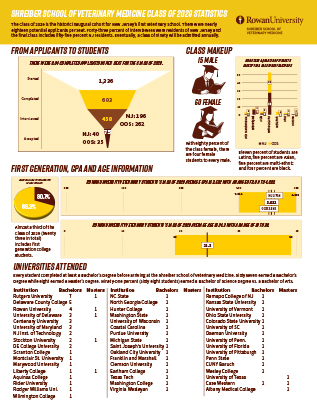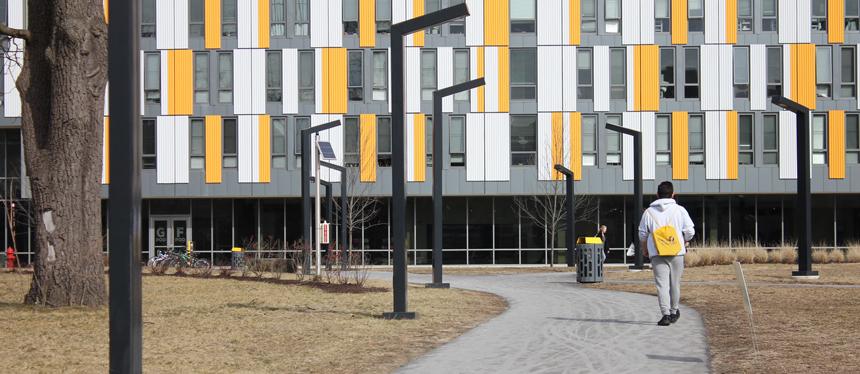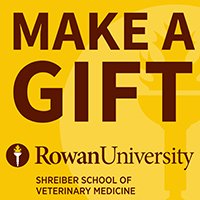Admissions Information
Admissions Information
Admissions Information
IMPORTANT NOTICE: The 3+4 Accelerated BS/DVM Pathway Program will not be accepting applications for the 2027-2028 academic year. Updates regarding future application cycles will be posted on this Admissions webpage.
The Shreiber School of Veterinary Medicine of Rowan University will accept applications for the next cycle via VMCAS.
Welcome to the Admissions website for the Shreiber School of Veterinary Medicine of Rowan University. Here you will find information about eligibility, admissions requirements, and the stages of our selection process. Our holistic review process aligns with our mission to prepare future veterinarians to serve society in a multitude of roles. To that end, we aim to admit a group of students that will thrive in a rigorous and synergistic learning environment and upon graduation be well prepared to serve a diverse society. We hope you are as excited as we are about the future of Veterinary Medicine in New Jersey and beyond!
The program completed a Comprehensive Site Visit in April 2024 and received a Letter of Reasonable Assurance in October 2024. As of September 2, 2025, Shreiber School of Veterinary Medicine of Rowan University is provisionally accredited by the American Veterinary Medical Association Council on Education.

Read this flyer to learn more about the historic first class at the Shreiber School of Veterinary Medicine of Rowan University - the Class of 2029.
Eligibility Criteria
- All candidates must have completed a minimum of 60 college credit hours from an accredited institution with a minimum overall GPA of 3.0 on a 4.0 scale. All course grades will be used in the calculation of the overall GPA including any repeated courses and graduate courses.
- Prospective international students must show proof of English language proficiency according to the Rowan University English Language Policy http://sites.rowan.edu/international/englishlanguagepolicy.html
- A baccalaureate degree is not required for admission, but most successful candidates will have completed an undergraduate degree prior to matriculation.
- No minimum number of hours of documented animal or veterinary experience is required. However, it is strongly recommended that applicants have a demonstrated understanding of the veterinary profession and evidence of exposure to varied animal and veterinary experiences.
- Standardized tests such as the Graduate Record Exam (GRE), the Medical College Admission Test (MCAT), and the CASPer test are not required for admissions and will not be evaluated during admission decisions.
Prerequisites
- The following courses must be completed prior to matriculation. A maximum of two prerequisite courses may be in progress at the time of application but must be completed and transcripts submitted prior to July 31st of the year of planned matriculation.
- Applicants must have received a minimum of C- or equivalent grade in all prerequisite courses to fulfill these requirements.
- Online courses that meet all prerequisite standards will be accepted. If a laboratory component is required, it must be completed in-person. This means it was taken in a laboratory setting with an instructor present. At-home laboratory kits are not considered to be in-person and do not meet this requirement.
- Considerations due to COVID-19 We understand that due to the COVID-19 pandemic, some courses may have been graded as Pass/Fail and/or delivered online. We will accept such prerequisites if they meet the following criteria:
- Pass/Fail grading - Prerequisites completed during the Spring 2020 through Spring 2022 semesters that were graded as Pass/Fail will be accepted providing a “Pass” grade was achieved. Pass/Fail courses will not be included in GPA calculations.
- Online courses with laboratory components – Prerequisites that require a laboratory component that was completed online during the spring 2020 through spring 2022 semesters will be accepted.
- Pass/Fail grading - Prerequisites completed during the Spring 2020 through Spring 2022 semesters that were graded as Pass/Fail will be accepted providing a “Pass” grade was achieved. Pass/Fail courses will not be included in GPA calculations.
- English or Writing-Intensive courses (6 semester credit hours)
- Advanced placement (AP) credit is accepted for up to 3 credit hours, but one college-level course on
composition or technical writing is required.
- Advanced placement (AP) credit is accepted for up to 3 credit hours, but one college-level course on
- Math (3 semester credit hours)
- The math requirement may be satisfied with 3 credits of a Calculus I or higher-level math course, a statistics course, or a physics course.
- The math requirement may be satisfied with 3 credits of a Calculus I or higher-level math course, a statistics course, or a physics course.
- General Biology* (6 semester credit hours)
- Two semester courses in general biology or the equivalent, each with an in-person laboratory
component.
- Two semester courses in general biology or the equivalent, each with an in-person laboratory
- Microbiology* (3 semester credit hours)
- A one-semester course with or without a laboratory component meets the minimum requirement.
- A one-semester course with or without a laboratory component meets the minimum requirement.
- Upper-Level Biology* (6 semester credit hours)
- Two upper-level biology courses (300-level or above) are required. Suggested subjects include anatomy, cell biology, immunology, neuroscience, physiology, virology, or zoology. Courses must meet the requirements for transfer to Rowan University at the 300-level or above to qualify. Applicants can use the Rowan Transfer Credit Evaluation Database https://sites.rowan.edu/registrar/transferring-credits/transfer-credit-evaluation-database.html to confirm course eligibility.
- Two upper-level biology courses (300-level or above) are required. Suggested subjects include anatomy, cell biology, immunology, neuroscience, physiology, virology, or zoology. Courses must meet the requirements for transfer to Rowan University at the 300-level or above to qualify. Applicants can use the Rowan Transfer Credit Evaluation Database https://sites.rowan.edu/registrar/transferring-credits/transfer-credit-evaluation-database.html to confirm course eligibility.
- Genetics* (3 semester credit hours)
- This course must include both Mendelian and molecular genetics.
- This course must include both Mendelian and molecular genetics.
- General Chemistry* (6 semester credit hours)
- Two semester courses in chemistry each with an in-person laboratory component is required.
- Two semester courses in chemistry each with an in-person laboratory component is required.
- Organic Chemistry* (4 semester credit hours)
- A one-semester course in organic chemistry with an in-person laboratory component is required.
- A one-semester course in organic chemistry with an in-person laboratory component is required.
- Biochemistry* (3 semester credit hours)
- A one-semester course with or without a laboratory component meets the minimum requirement.
- Social Science or Humanities (6 semester credit hours)
* There is no recency requirement for science prerequisites. However, to succeed in a veterinary medical curriculum, students require a solid foundation of knowledge of biological sciences. This is important to consider if there has been an extended period of time between when prerequisites were completed and applying for the program.
Selection Process
SSVM is committed to providing accessible, affordable, high-quality veterinary education. Below are the steps in the process through which students will go to determine whether they are admitted to the program.
Stage 1: Verification of Application Information
Applications will go through the Veterinary Medical College Application Service (VMCAS) http://www.aavmc.org/becoming-a-veterinarian/how-to-apply/
Applicants are strongly encouraged to start their application early as the closing dates will be adhered to without exception.
During Stage 1, all information in the application including transcripts, letters of reference, and prerequisite coursework will be verified. Only applicants that meet the eligibility criteria and prerequisite requirements will advance to the next stage.
Stage 2: Application Review
In this stage applicants will be evaluated and scored based on academic and non-academic performance.
Academic Performance – 35 points
Evidence of academic ability to succeed in the demanding 4-year program will be gathered from academic transcripts. All course grades, including repeated courses, will be factored into the Overall GPA and last 45-hour GPA. The highest grade in a course that satisfies the prerequisite requirement will be used to calculate prerequisite GPA.
- Overall GPA
- Prerequisite GPA
- Last 45-hour GPA
Non-Academic Performance – 65 points
While academic performance is an important metric when selecting students for a rigorous medical curriculum, it is only one determinant of what constitutes success as a veterinary student and ultimately, as a veterinarian. SSVM uses a holistic approach to identify individuals who have the attributes necessary to meet the SSVM mission to develop skillful, confident, and compassionate veterinary professionals in a collaborative environment that values trust, respect, empathy, and public service. Criteria reviewed include, but are not limited to the following:
- Personal statements
- Letters of reference - three required; one preferably from a veterinarian
- Understanding of the profession including breadth and depth of animal and veterinary experiences
- Awards and achievements
- Community service
- Experiences outside veterinary medicine
The top ranked candidates from Stage 2 will advance to Stage 3.
Stage 3: Interview
Interview - 25 points
Interviews will use a Multiple Mini Interview (MMI) format and be conducted virtually.
MMIs are short, structured interviews used to assess personal attributes and behaviors considered important to being a veterinarian. These attributes include communication, teamwork, and problem-solving abilities as well as important characteristics including empathy, honesty, and reliability.
Stage 4: Final Ranking
Candidates that complete Stage 3 will advance to Stage 4 and receive a final score based on the sum of scores from the application review and interview:
- Academic Factors 35 points
- Non-Academic Factors 65 points
- Interview 25 points
- Total possible points 125 points
The final candidates will be selected from two pools; in-state and out-of-state. We anticipate approximately half of the student body will be New Jersey residents and half will be from out of the state. Click here for Rowan University’s New Jersey Residency policy.
The Committee on Admissions makes final recommendations to the Dean for approval and the Dean will extend offers of admission to the selected candidates.
Financial Preparation
Pursuing a DVM degree is a professional, personal, and financial investment. Adhering to Rowan University’s strategic pillars of affordability and quality, Shreiber School of Veterinary Medicine is committed to delivering a high value educational experience.
We encourage prospective students to familiarize themselves with the cost of a DVM education and financially prepare for this journey using tools and services such as the AAVMC Cost Comparison.
Scholarships will be available via a competitive application process to help reduce the student educational costs.
Residency Information
The Shreiber School of Veterinary Medicine welcomes applications from both in-state and out-of-state applicants. Applicants to the Shreiber School of Veterinary Medicine should only indicate on the application that they are New Jersey residents if they can evidence domicile in New Jersey for the twelve months preceding application for admission. Domicile is a legal term which refers to an individual’s state of legal residence and is defined as the place where a person has his or her true, fixed, permanent home and principal establishment, and to which, whenever he or she is absent, he or she has the intention of returning. While an individual can maintain a residence in more than one state, an individual has only one state of legal residence, i.e., domicile. Residence in New Jersey that is established solely for the purpose of attending a particular educational institution does not constitute domicile in New Jersey. The Shreiber School of Veterinary Medicine may request documentation to support the declaration of New Jersey domicile.
See the Rowan University Residency Policy.
Complete the Shreiber School of Veterinary Medicine Domicile Verification Form.
State Licensure
Veterinarians practicing in the State of New Jersey apply for their license through the New Jersey Division of Consumer Affairs State Board of Veterinary Medical Examiners. Further information on that process can be found at https://www.njconsumeraffairs.gov/vet/Pages/applications.aspx. For veterinarians seeking to work in another state, the appropriate page on that state's Board of Veterinary Medicine website will provide more specific detail on that process.


